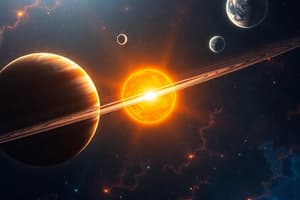Podcast
Questions and Answers
Which planet is known as the 'Red Planet'?
Which planet is known as the 'Red Planet'?
- Mars (correct)
- Neptune
- Saturn
- Jupiter
What characteristic distinguishes gas giants from terrestrial planets?
What characteristic distinguishes gas giants from terrestrial planets?
- Size and composition (correct)
- Ability to support water
- Presence of life
- Solid surface
Which planet has the thickest atmosphere, causing it to be the hottest?
Which planet has the thickest atmosphere, causing it to be the hottest?
- Uranus
- Venus (correct)
- Mercury
- Earth
What is the main composition of Jupiter?
What is the main composition of Jupiter?
Which of the following statements is true about Venus?
Which of the following statements is true about Venus?
Which planet is the coldest on average?
Which planet is the coldest on average?
Which of the following planets is the closest to the Sun?
Which of the following planets is the closest to the Sun?
What term describes the path of a planet around the Sun?
What term describes the path of a planet around the Sun?
Flashcards
Inner Planets
Inner Planets
Rocky planets close to the Sun: Mercury, Venus, Earth, and Mars.
Outer Planets
Outer Planets
Gas giants farther from the Sun: Jupiter, Saturn, Uranus, and Neptune.
Mercury
Mercury
Closest planet to the Sun, very hot and cold.
Venus
Venus
Signup and view all the flashcards
Earth
Earth
Signup and view all the flashcards
Mars
Mars
Signup and view all the flashcards
Jupiter
Jupiter
Signup and view all the flashcards
Saturn
Saturn
Signup and view all the flashcards
Study Notes
Solar System Flashcards - Planets
-
Flashcard 1: Planet: Mercury
- Closest to the Sun
- Very hot and very cold
- Smallest planet
-
Flashcard 2: Planet: Venus
- Covered in thick clouds
- Hottest planet
- Rotates backwards
-
Flashcard 3: Planet: Earth
- Only planet known to support life
- The "blue planet"
- Has liquid water
-
Flashcard 4: Planet: Mars
- Reddish color due to iron oxide
- Known as the "Red Planet"
- Possible past life
-
Flashcard 5: Planet: Jupiter
- Largest planet
- Mostly gas (hydrogen and helium)
- Great Red Spot (a massive storm)
-
Flashcard 6: Planet: Saturn
- Known for its rings
- Also largely made of gas
- Second largest planet
-
Flashcard 7: Planet: Uranus
- Rotates on its side
- Made of ice and gas
- Coldest planet in the Solar System (on average)
-
Flashcard 8: Planet: Neptune
- Farthest planet from the Sun
- Made of ice and gas
- Strong winds
Solar System Planets - Additional Points
- Inner Planets (Terrestrial): Mercury, Venus, Earth, and Mars. These are rocky planets, relatively small, and closer to the sun.
- Outer Planets (Gas Giants): Jupiter, Saturn, Uranus, and Neptune. Larger in size, predominantly made of gas (hydrogen and helium) and have rings.
- Dwarf Planets: (Not on flashcards, but important to mention). These are celestial bodies similar to planets but do not dominate their region of space. Examples include Pluto, Eris, and Ceres.
Key Concepts
- Orbit: The path of a planet around the Sun. Planets orbit in ellipses, not perfect circles.
- Rotation: The spinning of a planet on its axis. This determines the length of a day on a planet.
- Revolution: The movement of a planet around the sun. This determines the length of a year on a planet.
- Gravity: The force that keeps planets in orbit around the sun.
- Solar System: The Sun and the objects that orbit it, including planets, moons, asteroids, comets, and dust.
Planetary Characteristics - Details
- Orbit Distances: The distance of each planet from the Sun is significantly varied
- Size and Composition: Size and composition of each planet differs.
- Temperature: Varies dramatically depending on distance from the Sun.
- Rotation and Revolution: Rotation and revolution speed is diverse
- Moons: The number of moons orbiting each planet differs from planet to planet.
Studying That Suits You
Use AI to generate personalized quizzes and flashcards to suit your learning preferences.




